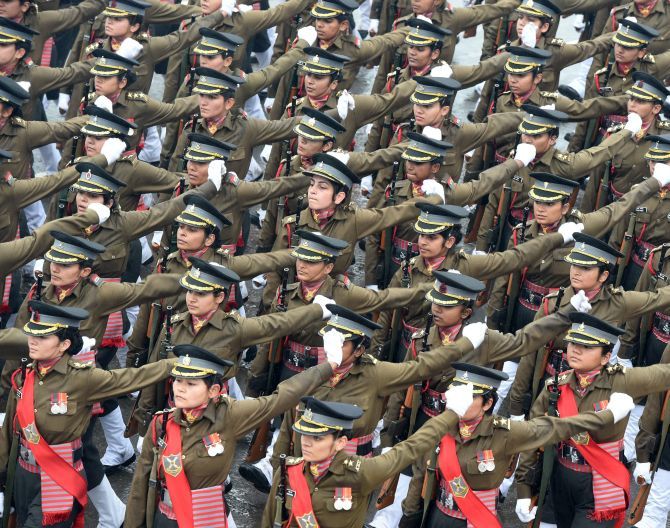In a landmark verdict, the Supreme Court on Monday directed the Centre to grant permanent commission to all women officers in the Indian Army within three months, terming the government's argument of physiological limitations and social norms for denying them command posts as "disturbing".

Calling for an end to gender bias in the armed forces, the Supreme Court on Monday opened the way for women in command positions in the army and directed the Centre to grant permanent commission to all women officers within three months.
A bench headed by Justice D Y Chandrachud termed "disturbing" the government's argument of physiological limitations and social norms for denying women officers command posts and said they had brought laurels to the country in the past.
Marking a milestone on the road to gender parity in the Army, the apex court bench called for a change of mindset on the part of the government to put an end to gender bias in the armed forces and said there will be no absolute bar on giving women command postings.
The bench, however, clarified that deployment of women officers in combat roles is a matter of policy as held by the Delhi high court and the competent authority has to look into it.
Slamming the Centre, the court said despite no stay on the 2010 Delhi high court verdict allowing grant of permanent commission to women officers, the government showed scant regard in implementing the directive in the past one decade.
It said the engagement of women officers in the army has been an evolutionary process and the Union of India should have acted in accordance with the Delhi high court judgment when there was no stay on it.
"There is no reason and justification for the Union of India not to act as per the Delhi high court verdict. On September 2, 2011, the Supreme Court has clarified this aspect and said there is no stay on the high court verdict. Despite that, scant regard has been paid to the verdict of Delhi high court and the order of Supreme Court as well," the bench said.
The bench said it is of the opinion that physiological features of women have no effect in granting permanent commission and they have to be given equal opportunity at par with their male counterparts in the armed forces.
The top court said there is need for a change in mindset with regard to giving equal opportunity to women officers in the Indian Army even after 70 years of post-colonial era.
It said the Centre's submission of physiological limitation is based on flawed notions and there is no constitutional basis to deny them equal opportunity.
There are 1,653 women officers in the Army, 3.89 per cent of the total number of officers in the army.
According to the court, women officers brought laurels to the country and won several gallantry and Sena medals as well as UN Peacekeeping awards for their contribution in armed forces. To cast aspersions on them on the basis of physiological features is wrong as it is based on fallacy, it said.
The top court said permanent commission can be given to women officers in the army irrespective of their tenure of service. It also directed the Centre to grant permanent commission within three months to all women officers in army who opt for it.
The verdict led to jubilation among women officers waiting outside the court for the verdict.
Accompanied by her women colleagues, one officer said it will help uplift women across the country and not the armed forces. Whoever qualifies for the job should be given the opportunity to command, she said.
"The sky is virtually the limit," said advocate Meenakshi Lekhi, who appeared for the women officers.
She said the apex court judgment has given women officers the same rights as their male counterparts.
Lekhi added that the order gives a long-pending right to the women officers.
On February 9, serving women officers in the Indian Army countered the Centre's stand in the apex court on denying command posts to women on the ground of their physiological limitations, terming it not only "regressive but also completely contrary to the demonstrated record and statistics".
In their written submission to the court, the women officers sought rejection of the submission of the Centre. They they have been serving in the 10 Combat Support Arms, for the last 27 to 28 years and have proven their mettle and courage under fire.
The written submission also said the women officers have demonstrated that they do not lack in any manner in the roles that have been assigned to them.
According to a policy letter dated February 25, 2019, the women officers said, permanent commission to women officers was being confined to "staff appointments only" as against "criteria appointments/command appointments".
They contended that no such confinement of women officers to staff appointments only has ever been contemplated or notified in any of the advertisements or policy decisions since 1992, when women were first inducted into the Indian Army.
The Centre had submitted a written note in the apex court, containing the proposal of the government.
It points out to several issues, including "physical prowess" and "physiological limitations" as challenges for women officers to meet the exigencies of service in the army.










 © 2025
© 2025